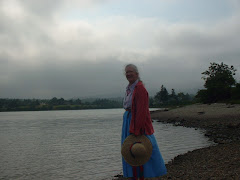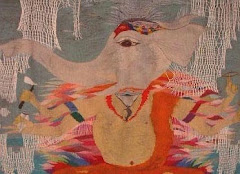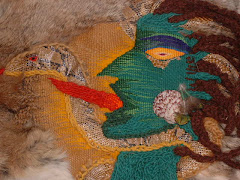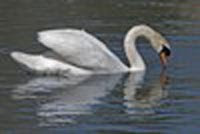
Chapter Nine
I remember a fisherman in India, after the killer wave hit his village, who said, "The fish aren't where we used to find them." The tsunami had altered the sea. And there were the deaths, the broken bones, the mass cremation, the homes and fishing boats smashed into rubble. As a result of my experience in India, something was shaken loose inside of me, an inner shift that now allows me to accept a job in a Christian church, an institution for which, over the years, I had developed an intense disdain.
Why disdain? It began in college where I learned about the Spanish Inquisition and the burning of women who knew how to heal with herbs. The Crusaders who destroyed Mosques in the Holy Land. The priests and missionaries who subdued and converted native people from all lands, for the sake of a "better God." And because, as a teen-ager, I had dreamed of being a Christian minister, and in college found friends of other religions that spoke of the same truth. I could no longer justify my religion's belief in "we are the only way." A few years later I entered an ashram and lived for most of my adult life as a Hindu monastic.
Now, at the church where I've taken the job as secretary, Mac Bigelow, the minister, invites me to join his monthly “Faith and Experience” discussion group that meets in a private home. The topic at the next meeting is “What is Holy Spirit?” I don't know why I accept, but I swallow hard and say I will.
Bracing for an Inquisition-style mind-set, on the appointed evening I follow a pathway to a house nestled in the woods. Ten or more of us gather around the fire in a well-appointed living room. I listen for the first hour, arms folded across my chest, looking around at the faces, solid New England types in corduroy pants and L.L. Bean boat shoes, an intellectual set. Hands hot and wet, pulse quickening, I open my mouth. “Is it possible that Holy Spirit is feminine?” No one crosses their legs or taps their fingers. They listen. Then Mac reads a quote about just that, and something else from C.G. Jung supporting the notion. I breathe deeply and say more about God as She.
Several months later Mac invites me to speak on Hinduism from the pulpit. The congregation has asked to learn about other religions. I’m not sure who’s converting whom, but my distaste for Christianity, at least the way it is with Mac’s church, has softened to melting. I find none of the religious exclusivity Christians are known for. On the designated Sunday, I begin by telling about my teen-age desire to become a minister and my subsequent contempt, about Hinduism’s belief that all desires are ultimately fulfilled, and that now here I am, nearly fifty years later, standing in the pulpit.
Two older women come up to me after, hesitant. One of them speaks, nearly whispering. “What you talked about… it isn’t much different than what we believe.”
Some will return to life-as-usual after a catastrophic event or death of a loved one, or any opportunity for change, like finding out that you no longer need to hold on to the belief that all Christian churches are intolerant. Patterns tend to bind—family patterns, social patterns, self-concept patterns, religious patterns.
To break constricting habits one must complete what Joseph Campbell calls the hero’s journey, which means any time a person steps out of reality as that person knows it, and enters into the challenge of a potentially life-changing experience, big or small, and then comes back with a story to tell and a way to help others.
Some typical archetypes of the transformational crossing can be seen in such stories as Hansel and Gretel, Jonah in the belly of the whale, and young Arthur pulling the sword from the stone. The metaphors contained in myths and fables signify one’s own sacred journey, the path to what Carl Jung calls individuation—the fulfillment of who one is at the core.
Here’s an example in a Greek myth : Persephone, daughter of the fertility goddess Demeter, frolics in the meadows and among the olive trees, picking flowers and fruits, communing with animals, and dancing under the stars on full Moon nights. She helps her mother with the harvest, and lives without fear, assured that her mother and her father Zeus will keep her from harm. One day while Persephone collects flowers to adorn her hair, the earth begins to shake; a chasm opens; Hades, Lord of the Underworld, rises up and kidnaps Persephone, carries her off to the lower realms.
Demeter, archetype of the Great Mother, searches for her daughter everywhere. When Persephone is no where to be found, Demeter goes mad and the fields and trees stop yielding. Since all beings and all living things will die without Demeter’s harvest, the gods plead with Zeus to persuade Hades to release Persephone.
Finally the Lord of the Underworld strikes a deal. He will let her go up, but because she’s eaten some of his pomegranate seeds, she must return to Hades every year, for a third of the year, during winter when all things die.
Satisfied, Persephone’s mother once again resumes her task of nurturing a fruitful harvest. When Persephone returns to her mother's realm, Persephone breaks her usual pattern of relationship with family and friends. She has undergone a death to her old self, and has come to love Hades, to enjoy his loyalty to her. No longer going about her daily life under her mother’s apron strings, Persephone is now equal to Demeter. She is grown into a woman of power and wisdom, and as Queen and Guide of the Underworld, she now ushers people between realms.
When one changes patterns, there is often grief, or at least profound challenge, at the loss of the same old relationships with friends and family members. Loved ones often cannot or will not adjust to the one who has changed. It can be devastating to live with others when you have faced death and they have not. Or to stay in friendship when you have met calamity in the face, and your friends have not.
Sometimes the pain of separation is too great for the one who has returned from a far journey—be it war, living in a foreign land, wilderness trek, death of a loved one, or experience of a natural disaster. Sometimes the traveler, feeling pressure, chooses to return to old habits and patterns simply to avoid loneliness, to feel love no matter how disingenuous. Others, no doubt, will develop new associations that support the shift in consciousness, perhaps finding in new friends a pathway to unconditional love. Others will simply remain lonely, perhaps growing accustomed to the depth of solitude, perhaps finding a new kind of companionship there, a solace at the core of being.
Blessed are you in the midst of persecution who, When they hate and pursue you even to the core of your being, Cannot find “you” anywhere. —Gnostic Gospel of Thomas
Imagine the freedom in that!
What the caterpillar calls the end of the world, the master calls a butterfly. --Chuang Tse
Coda: Consider the Native American Heyoka, the sacred clowns who are known for doing things backwards, upside down, or in some way contrary. One clown might ride a horse wrong-way-around, put on a woolen blanket on a hot day, question sensitive taboos, or speak aloud ideas others feared to express. These clowns’ strange ways cause people to laugh, to think, to penetrate more deeply into themselves, to become aware of fears, hatreds, and weaknesses, to examine self-deceptions—to look at what lies underneath the rock. The Heyoka are the carriers of sacred knowledge.








4 comments:
Great post and also loved the quotes from Gospel of Thomas and from Chuang Tse, neither of which I had ever heard before. I have copied them into my notebook and will share with others. Thank you! Colleen
Dear Colleen,
Loved getting feedback for quite an old post! And was happy to provide some thoughts and quotes that you've found worthy of your notebook and to share with others.
Dear Savitri,
I have been searching for someone to guide me but those who follow the way are very hard to find. I try to go to counselors but I leave after 5 minutes because the space feels wrong and they don't see magic. I am an art student and those in my school don't see spirituality. They see Witches and Clowns as cheap mechanically made jersey knits in October.
Suddenly the door is unlocked, one side white one side black. I met a stranger who wanted to save the lost and couldn't, I looked into his eyes and told him I was in a dark place. He said I am a spiritual warrior in the coming revolution.
I have just been looking for wise crone woman but I can't find one. I love my mother but she hasn't found her way yet.
I didn't know about vicki noble, but when I read about her relationship to marija gimbutas...! I have been searching for the right tarot deck for me.
Thank you for this space to pass on information to me.
tippi
Dear Tippi,
Certainly it can be difficult to find what you are looking for, a counselor with magic, and art students on spiritual paths. These people are all out there and so I would recommend staying optimistic that you will find what you are seeking.
While Jungian therapists are not all going to be a perfect match, I would suggest starting there, as they, by training, are emersed in the "magic" of dreams, archetypes, and the collective unconscious.
I would suggest two authors: Alice O. Howell, "The Dove in the Stone" and her book on astrological archetypes. Then way up on my list of magical Jungians is Jean Shinoda Bolen.
Perhaps start by reading Bolen's "The Goddess in Every Woman." I've read all her books and therefore can recommend them as ways to get started.
After that you really do need to find a guide, such as a Jungian therapist or some other therapist with transpersonal training and experience.
There are so many Tarot decks, it's hard to choose. I use the Thoth deck and Angeles Arien's book "The Tarot Handbook." Angie is Basque and raised with magic.
Then it wouldn't hurt to try to meet my guru, Amma (Ammachi) the "Hugging Saint," if you happen to live in a town near any of the many she visits in the summer. check her websites listed on my blog.
Post a Comment